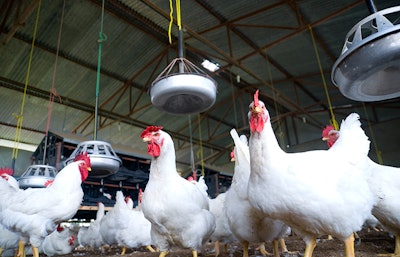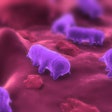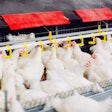
Researchers at Iowa State University have discovered a new approach to fight Salmonella in poultry that exploits the linkages between the gut neurochemical and immune systems.
“There has been a lot of frustration among poultry farmers on the long-standing challenge of eradicating Salmonella and other harmful bacteria in poultry production,” explained Melha Mellata, associate professor in the Department of Food Science and Human Nutrition at Iowa State University.
“Thinking outside of the box helped us discover a new strategy – exploring the neuroimmunology pathway and Salmonella persistence in the chicken gut. Our study will open new doors on developing new approaches to minimize and, we believe, even eliminate Salmonella and other harmful bacteria in poultry production.”
Salmonella is gram-negative anaerobic bacterium that is responsible for approximately 1.35 million illnesses, 26,500 hospitalizations and 420 deaths in the U.S. each year, according to data from the Centers for Disease Control and Prevention (CDC). The bacteria has become increasingly multi-drug resistant, making it more difficult to treat.
Most Salmonella infections in humans are foodborne in origin, however, many animals – including chickens – can harbor the bacteria without becoming sick.
Linkages between poultry gut systems
In a study published this month in Nature Communications Biology, the researchers found that the drug Reserpine reduced the incidence of Salmonella and other potentially harmful bacteria in chicken cells and organs in the laboratory and in live birds.
The drug works by triggering the release of a naturally occurring neurochemical called norepinephrine from intestinal cells. In turn, norepinephrine activates an antimicrobial immune response against the pathogen.
“When Salmonella establishes itself in a chicken’s gut, it tricks the host. It develops a peaceful immunity, which means the immune cells that do emerge, do not fight against these bacteria. What we found is these gut immune cells stock inside of themselves neurochemicals, including norepinephrine,” Mellata said.
“Our recent work has shown which pathway to activate to trigger elimination of harmful bacteria that reside in the gut, with no side effects for chickens. We are now pursuing this research to find the best drug to use in real poultry farm applications. Reserpine was used in the past, but based on our recent studies, it should probably only be used for a limited time and only during the very first days post-hatch.”

















